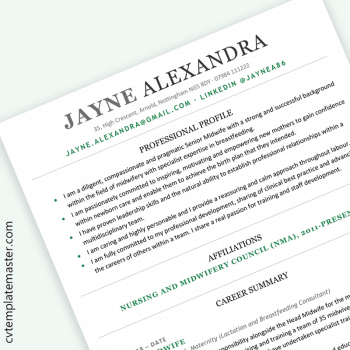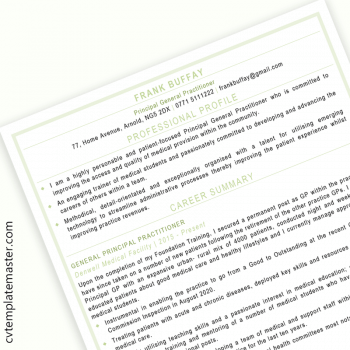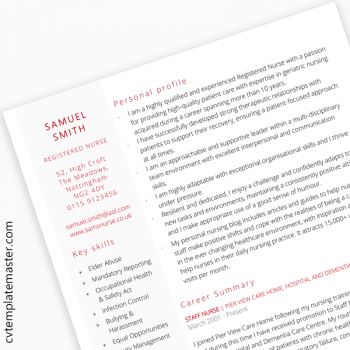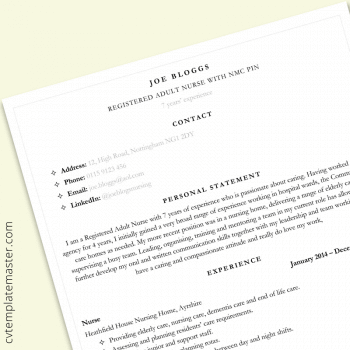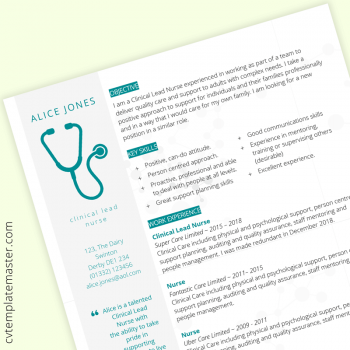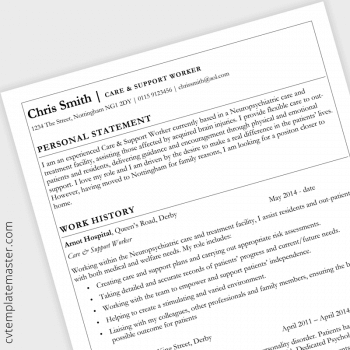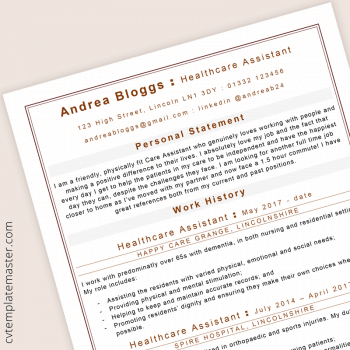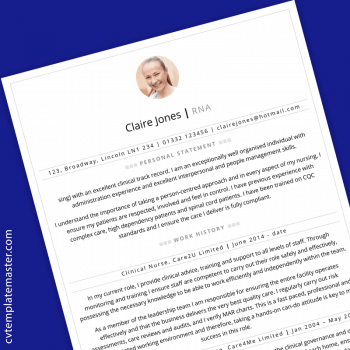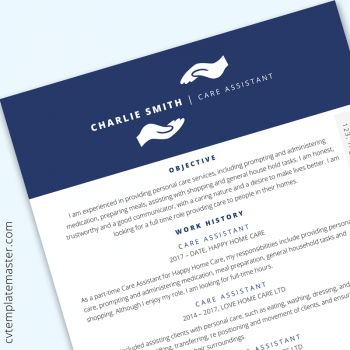How to write a care and nursing CV
A CV for the care or nursing industry follows the same format as a regular CV, but certain information needs to be emphasised. In this guide, we explain exactly what sections to include and what skills a typical employer wants to see.
Write a CV for every role
Tailoring your CV to the role you’re applying for is essential. Employers don’t want to see a generic CV – they want to see a focus on the skills and experience that they have identified as being important in the job advert. At all times when writing your CV, keep the job advert to hand and try to use the same words and phrases that the employer has used.
Give examples
It’s easy to simply list off the skills that the employer wants – but everyone can do that! Your care or nursing CV will be so much more powerful if you back up your claims with examples of how you’ve acquired and/or used a particular skill. Don’t worry, we’ll show you exactly how you can do this!
CV format
The format for a care or nursing CV is:
- Name and contact information
- Personal statement
- Work history
- Qualifications
- Skills
- Hobbies and interests
- References
You can deviate slightly from this by putting your skills before your work history, if you want to. This is usually recommended where:
- You have a limited work history, or
- Your skills are the most important thing the employer is looking for.
Name and contact information
Give your first and last name, address with postcode, phone number(s) and email address.
You may wish to mention that you have a driving licence if it is relevant to the job (as it often is in the care industry).
Don’t give any personal information (such as marital status, whether you have children, your nationality or religion) unless it is directly relevant to the role, to avoid any possibility of an employer discriminating against you.
Personal statement
This should be 3 – 4 sentences long and should set out exactly why the employer should hire you, with reference to the job advert. Typically, you’ll introduce yourself, explain how you meet the requirements of the job and tell the employer what you’re looking for. Here are some examples:
Example 1:
I am a health care assistant with two years previous work experience within a community care setting. I am a friendly outgoing person who is passionate about providing the kind of care that gives residents a real sense of security, dignity and independence. I enjoy getting to know the people I am caring for and their families, and delivering a truly personalised plan of care to meet their individual needs. I am looking for a part time role (around 20 hours a week) and I am flexible as to times/days.
Example 2:
I am a hardworking team player who understands what is important to those I am caring for and does everything to make sure their lives are as happy as they can be. In my current role, I deliver quality personal care to each resident, including supporting them with washing, dressing, eating and maintaining their hygiene, as well as ensuring they feel part of life in the home. I provide care, warmth and kindness to help make a difference, while developing strong positive relationships with their families in order to better understand their needs. I am looking for a full time role and I am happy to work some evening/weekend shifts.
TIP: Not every job advert is clear about the skills desirable for this type of role. If the advert you’ve found contains very little detail, have a look at some sample job profiles for the target care or nursing role. For example:
- Healthcare assistant – NHS or the Telegraph
- Care worker – National Careers Service
- Nursing assistant – Scots NHS (Word file – this is a really good breakdown of the sort of tasks you’ll do)
Work history
Your work history should be listed in reverse chronological order which means the most recent post should be first.
For a care or nursing role, it really helps to outline the type of work you’ve done previously. For example, have you done any routine measurements such as height, weight or blood pressure? Have you administered medicine? Have you used any IT management systems such as a practice management system? Explaining which tasks you have done previously will help give prospective employers confidence that you are capable of doing the role you’re interested in.
You should also mention any work achievements such as:
- Commendation by your managers
- Ideas that you had which were successfully introduced, and the results
- Targets met or exceeded
You can include other types of experience in this section such as:
- Volunteering
- Community projects
- Projects you completed while studying
Qualifications
List your qualifications with the most recent first.
Employers do like to see BTEC or NVQ but you will find plenty of advertised posts where no qualifications are required at all – the employer is more interested in your attitude and personality.
Even if the employer doesn’t request any qualifications, do list any you have such as GCSEs and A Levels. You can also include any training you’ve had in previous positions here (if relevant to the role).
Consider whether you acquired any skills while studying for a qualification which may be of interest to the employer.
Skills
You may already have spoken about your skills in your personal statement, work history and qualifications sections, but having a special skills section can help ensure the employer doesn’t miss anything.
Skills that are very important for care type roles include:
- Ability to work on own initiative and prioritise workload
- Excellent listening and communication skills
- Ability to understand and follow policies and procedures
- Good writing skills for care plans
However, it’s not enough simply to list these off. A better approach is to explain how you acquired or used the skill. For example:
- In my last two roles, I have shown that I am capable of working on my own initiative …
- In my previous positions I have always had a busy workload which I have prioritised myself …
- Through experience of working with patients in my current position and volunteering, I have developed excellent listening and communication skills …
- I am highly capable of producing comprehensive care plans and can provide examples on request …
NB: If you do provide examples of past work, ensure patients’ details are completely obscured/redacted.
Hobbies and interests
This is a highly underutilised section of many CVs. Use it to:
- Further support your claims that you have relevant skills
- Show that you’re a fit healthy individual who takes an interest in their personal wellbeing.
- Show that you have interests that would be an advantage when working with people you would typically encounter in your target role.
For example:
- “In my spare time I volunteer for our local companionship project which involves visiting and spending time with elderly people who have very little family. This has helped me further develop a wide range of communication skills which I use in my every day work …”
- “In my spare time I love walking, hiking and cycling. I also visit the gym at least once a week to stay fit and healthy, to meet the demands of the job …”
- “I love playing the piano and I sometimes play to the residents at the care home where I work …”
- “I am a keen gardener and love chatting to patients about my hobby. They are usually full of advice and love telling me about their own gardening experiences …”
References
You have several options for this section. You can:
- Write “references available on request.”
- Give two references (one of which should be your current employer)
- Leave the section off altogether.
Whatever you decide, the employer will usually request at least two references if they are ready to offer you the job. There’s more guidance to choosing appropriate references here.
